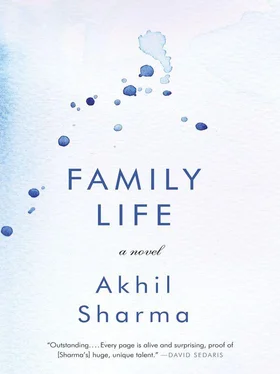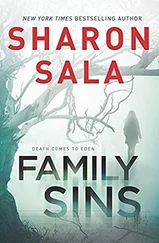A YEAR HAD GONE by since Birju’s accident. My father began shaving him. The first time he did this was one afternoon. My mother and I stood and watched as he put shaving cream on Birju’s cheeks. “Take your time,” my mother said. “Be careful.”
Birju lay there calmly as my father lathered him. It seemed unfair that something like this could happen and the world go on.
One Friday night in December, my father came home late. My mother was cooking dinner. He entered the apartment and leaned back against the gray metal door. He was smiling. He crossed a foot over a knee and began unlacing a boot.
“Do you have news?” my mother asked.
“Yes,” my father said. He kept smiling.
“Don’t say anything.”
My mother took a spoon, dug it into the sugar bowl that was on the counter, and passed it to him. My father put the heaped spoon in his mouth. The handle stuck out like a thermometer.
My mother said, “Now you can speak.”
My father removed the spoon. “Six hundred and eighteen thousand dollars.”
I didn’t know what this meant. I had thought we might get a hundred million dollars or maybe a billion. Six hundred and eighteen thousand dollars was so small that it hardly seemed to count. It seemed a very ordinary thing, like a cup or a pair of shoes.
I began to feel I had not heard correctly. I was lying on the sofa, a hardcover science fiction book standing upright on my stomach.
My mother stared at my father. She was yellowy in the apartment’s fluorescent light, and the skin beneath her eyes looked singed. “You said it would be one million.”
“A third goes to the lawyer.”
“That means six hundred and sixty-six thousand.”
“There were expenses.”
“Fifty thousand dollars to mail letters, to xerox,” she said angrily.
“Shuba, Shuba.”
“What did he do for three hundred thousand dollars?” My mother said this and looked away from my father. She was silent. After a moment, she turned back to him. “I don’t care about money. As long as we can afford medicine, that’s all that matters.”
She spread newspaper on the floor, and we sat down to eat. My mouth was dry as I chewed, and when I swallowed, the roti felt sharp.
After dinner we walked to the temple to give thanks. It was snowing. The snowflakes, as they drifted through the glow of the streetlights, resembled moths. I thought about the amount of the settlement.
My father had said that financial settlements were based on how much the person injured could earn. As I walked, I thought of how much the money meant in terms of hourly pay. I reasoned that my mother went to the nursing home every day. She was there from eight thirty to seven. This meant she worked about ten hours a day, seven days a week. I was there from three to seven every weekday and both days on the weekend. I was not working all the time, though, when I was at the home. My father was also there on weeknights and weekends. If I were to undercount, my father and I each spent twenty hours a week at the nursing home. Birju was damaged all the time, and so this could count as a hundred hours of work a week. Two hundred and ten hours a week times fifty weeks was about ten thousand hours a year. If Birju remained alive for ten years, that was a hundred thousand hours of work. Six hundred and eighteen divided by a hundred was six dollars and eighteen cents.
I had been hoping for a ridiculously low sum, like a dollar. When I got the six dollars and eighteen cents, I was startled. My mother, I knew, had gotten paid five and a half dollars an hour when she worked at the sewing factory. Six dollars and eighteen cents did not seem unfair for a boy.
The next day in Birju’s room, my mother proposed that my father take me to a movie. It was as if we had decided to pretend that we had received good news and should celebrate. My mother said I should see Gandhi . “Go see it and learn something.” I didn’t want to see a movie. I felt shame at the thought of spending money. If I were going to see a movie, though, I wanted to see E.T. “What rubbish,” my mother said. “Monsters from the moon.”
THE AGREEMENT CAME in the mail. It was actually several contracts printed on legal-sized paper. Because we didn’t have a table in our apartment, my father spread the contracts on the sofa. He and my mother kneeled and signed. I wondered if I, too, would be asked to sign. I hadn’t signed many things in my life. I imagined refusing and demanding more money. I asked my mother if I had to sign.
She laughed. She kissed me. “Why should you sign?”
It seemed to me that the judge who had decided how much Birju was worth must have also decided that I didn’t matter very much. I might talk about loving my brother, but he probably hadn’t believed that I actually did.
THE NURSING HOME that Birju was in was not good. We had known this for a while. One morning my mother and I walked into Birju’s room. The lights were off and the window shades down. Birju was on his bed, on his side, behind the raised railings. He was panting.
My mother turned on the lights. Tears were streaming down Birju’s face. He was propped up by pillows. Every two hours an aide was supposed to enter Birju’s room and turn him from one side to the other. The night aide must have forgotten to do so.
“Every night when I leave him, I feel like I’m leaving him in a stairwell,” my mother said. She hurried around the bed so that she was between the bed and the wall. She told me to come hold Birju so that he remained on his side. I put my hands on his arm and hip. He was so wet from sweat it was as if someone had poured water over him. My mother removed the pillows, and I slowly lowered my brother onto his back.
Regularly, we found things lying beneath Birju, things that the night aides had dropped: thermometers, latex gloves, cookies, once even a pair of scissors. What scared us most was when he was not fed on time. Birju was supposed to be given half a can of Isocal formula every three hours. Often the aide forgot or got too busy to do so, then came and gave him a full can. The full can was too much food. Birju’s face turned purple when this happened. We cranked up the top of his bed in case he vomited. Often he did. He’d open his mouth as if to burp. The Isocal, white and smelling of medicine and without the vinegar of gastric juices, would gush out along with whatever medications he had been given, including his beclamide, which kept him from having convulsions.
This was frightening because convulsions could cause more brain damage. My mother screamed at an aide once. The aide had given Birju a whole can and was still standing by the side of the bed as Birju vomited. “What does this mean?” she screamed. “What about the beclamide? Do we have to give him the beclamide again?” My mother’s fists were clenched, and she was leaning forward. “Do you know? Do you think we’ll be able to get a doctor to tell us? How long will it take to find out?”
Often I imagined being a gangster. I imagined looking like Amitabh Bachchan and beating the nurse’s aides and having them spend all night sitting trembling in Birju’s room.
After the settlement, we began visiting other nursing homes to see if we could move Birju to one of them. The first home we went to was in Connecticut. It cost $160,000 a year, but we went so we could see what such a home was like. We drove there on a January afternoon, crossing bridges and driving on wide, sunny highways.
The nursing home was up a long private road lined with trees. The road led to a vast lawn. A large yellow house surrounded by a porch looked out over the lawn.
The house was bigger inside than it appeared from the outside. There were hallways that seemed to run the length of a football field.
Читать дальше












